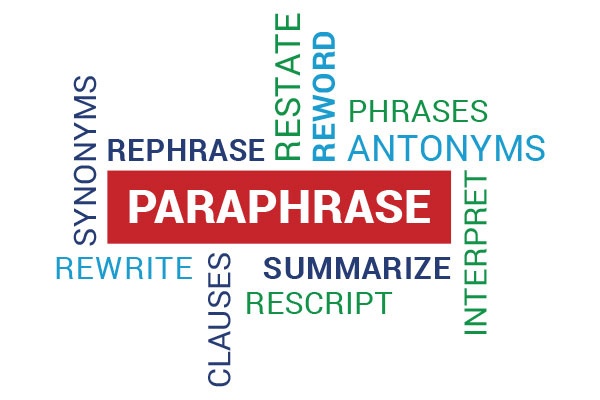Learn to Paraphrase
In last week’s blog post I briefly mentioned paraphrasing and thought it would be a great idea to give some more examples of this simple technique. To paraphrase basically means to reword any given phrase, that is, to say the same thing, but in a slightly different way, and often these nuances are very small.

Here are some short examples:
It’s a new day. (es un nuevo día)
A new day, a new chance. (un día nuevo, una nueva oportunidad)
Yet another day, yet another chance. (con otro día, otra oportunidad)
A new day means new opportunities. (un nuevo día trae nuevas oportunidades)
I get up. (me levanto)
I get out of bed. (salgo de la cama)
I roll out of bed. (recién salgo de la cama)
I always do. (siempre lo hago)
I do it every day. (lo hago todos los días)
The same thing happens every day. (todos los días hago lo mismo)
I’ve lost my phone. (perdí mi celular)
Where’s my phone? (¿dónde está mi celular?)
I cannot find my phone. (no encuentro mi celular)
My phone has gone. (mi celular se perdió)
This always happens. (siempre pasa lo mismo)
This happens too often. (me pasa muy seguido)
Why does this always happen? (¿por qué siempre pasa lo mismo?)
This is just typical. (típico…)
Where is it? (¿dónde está?)
Is it lost? (se perdió?)
Where is it hiding? (¿dónde se estará escondiendo?)
This is unfair. (esto es injusto)
This is so out of order. (esto está muy mal)
This is not right. (esto no está bien)
What’s happening? (¿qué está pasando?)
What’s going on? (¿qué pasa?)
This cannot be happening (esto no puede estar pasando…)
What did I do? (¿qué hice?)
Did I do something wrong? (¿hice algo mal?)
Is it my fault? (¿es mi culpa?)
Maybe it’s been stolen. (quizá lo robaron)
Did a thief take it? (¿se lo llevó un ladrón?)
I think it’s gotten into the wrong hands. (creo que cayó en las manos equivocadas)
I’ll look for it. (lo buscaré)
Better get looking. (mejor buscarlo)
I’d better start searching for it. (mejor empiezo a buscarlo)
It has to be here. (tiene que estar acá)
It can’t be far away. (no puede estar muy lejos)
It’ll turn up soon enough. (ya va a aparecer…)
The little rascal. (pequeño mocoso…)
It’s so naughty. (es tan travieso)
How mischievous to hide from me. (qué pícaro que se esconda así de mi)
It’s in my pocket. (está en mi bolsillo)
It’s hiding in my jeans (lo tengo en el jean)
It was in my pocket all along (lo tuve en mi bolsillo todo el tiempo)
Silly me (qué tonto…)
I’m so stupid (soy muy boludo)
How naive of me (qué ingenuo soy…)
As you can see, this is a very short and simple story and illustrates how malleable the English language can be. Practice in your own language and see what you can come up with.
Below is another short story. Take each sentence and see how many variations you can make. We’d love to see what you find, so leave a comment or send us a mail with you paraphrasing examples:
It’s snowing.
It’s completely white outside.
And cold.
But I like the snow.
You can do a lot when it snows.
It’s exciting.
Winter is the best time of year.
But summer is also good.
There’s only one problem.
Christmas doesn’t come in the summer.
Neither does Santa Claus.
Oh well.
Now it’s Christmas.
Enjoy it.
Podcast: Play in new window | Download


excelente y también destacable sitio de blogs.
De hecho, me gustaría darle las gracias por ofrecernos una información mucho mejor.
Muchas gracias por tu comentario! Nos alegra saber que resulta útil!